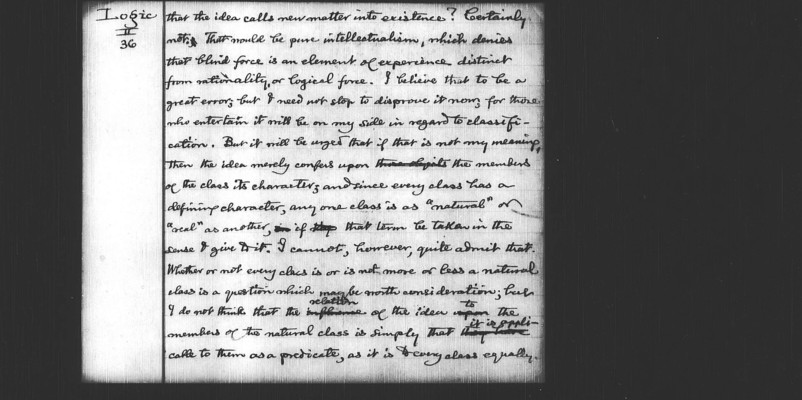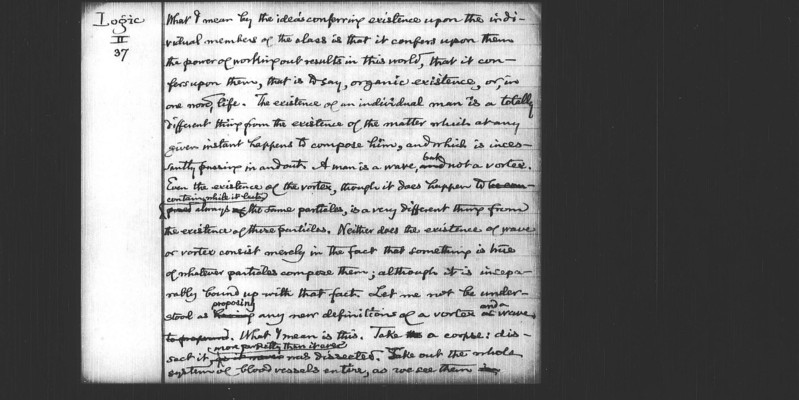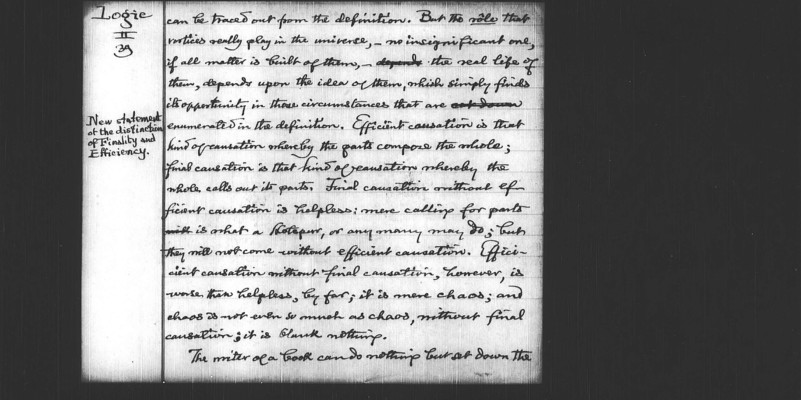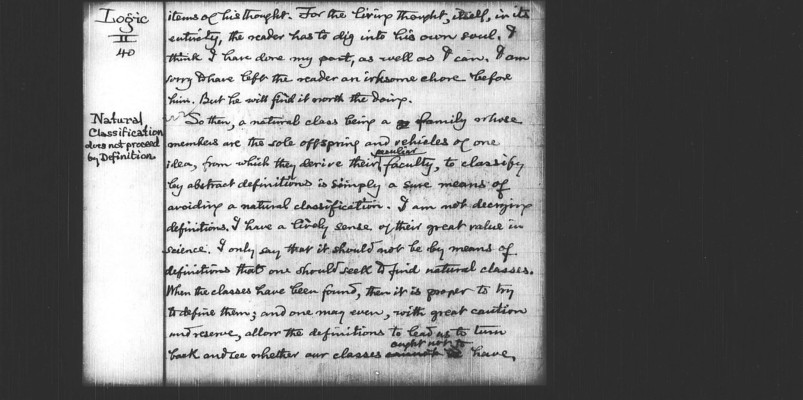Pages
36
Logic II 36
that the idea calls new matter into existence? Certainly not. That would be pure intellectualism, which denies that blind force is an element of experience distinct from rationality or logical force. I believe that to be a great error; but I need not stop to disprove it now, for those who entertain it will be on my side in regard to classification. But it will be urged that if that is not my meaning, then the idea merely confers upon those objects the members of the class its character, any one class is as "natural" or "real" as another, in if [?] that term be taken in the sense I give to it. I cannot, however, quite admit that. Whether or not every class is or is not more or less a natural class is a question which may be worth consideration; but I do not think that the influence relation of the idea upon to the members of the natural class is simply that they have it is applicable to them as a predicate, as it is to every class equally.
37
Logic II 37
What I mean by the ideas conferring existence upon the individual members of the class is that it confers upon them the power of working out results in this world, that it confers upon them, that is to say, organic existence, or, in one word, life. The existence of an individual man is a totally different thing from the existence of the matter which at any given instant happens to compose him, and which is incessantly passing in and out. A man is a wave, and but not a vortex. Even the existence of the vortex, though it does happen to be composed contain while it lasts always of the same particles, is a very different thing from the existence of these particles. Neither does the existence of wave or vortex consist merely in the fact that something is true of whatever particles compose them; although it is inseparably bound up with that fact. Let me not be understood as having proposing any new definitions of a vortex or and a wave to [propose?]. What I mean is this. Take the a corpse: dissect it , it is never more perfectly than it ever was dissected. Take out the whole system of blood vessels entire, as we see them [in?]
38
Logic II 38
{section title: A definition is an affair of Efficiency.}
figured in the books. Treat the whole systems of spinal and sympathetic nerves, the alimentary canal with its adjuvants, the muscular system, the osseous system in the same way. Hang these all in a cabinet so that from a certain point of view [???] [??] [??????] each appears superposed over the others in its proper place. That would be a [very?] singularly instructive specimen. But to call it a man would be what nobody would, for an instant propose do or dream. Now the best definition that ever was framed is, at least, but a similar dissection. It will not really work in the world as the object defined will, although of. It will enable us to see how the thing works, in so far as it shows the efficient causation. The final causation, which is what characterizes the definition, it leaves out of account. We make smoke rings. We make one pass through another, and perform various experiments, which give us an imperfect idea, yet some idea, of what a vortex really is. How all these things happen
39
Logic II 39
{Section title: New statement of the distinction of Finality and Efficiency.}
can be traced out from the definition. But the rôle that vortices really play in the universe, -- no insignificant one, if all matter is built of them, -- depends the real life of them, depends upon the idea of them, which simple finds its opportunity in those circumstances that are set down enumerated in the definition. Efficient causation is that kind of causation whereby the parts compose the whole; final causation is that kind of causation whereby the whole calls out its parts. Final causation without efficient causation is helpless: mere calling for parts will is what a [Hotepoor?], or any many may do; but they will not come without efficient causation. Efficient causation without final causation, however, is worse than helpless, by far; it is mere chaos; and chaos is not even so much as chaos, without final causation; it is blank nothing.
The writer of a book can do nothing but set down the
40
Logic II 40
{Section title: Natural Classification does not proceed by Definition.}
items of his thought. For the living thought, itself, in its entirety, the reader has to dig into his own soul. I think I have done my part, as well as I can. I am sorry to have left the reader an irksome chore before him. But he will find it worth the doing.
So then, a natural class being a family whose members are the sole offspring and vehicles of one idea, from whch they derive their peculiar faculty, to classify by abstract definitions is simple a sure means of avoiding a natural classification. I am not decrying definitions. I have a lively sense of their great value in science. I only say that it should not be by manes of definitions that one should seek to find natural classes. When the classes have been found, then it is proper to try to define them; and one may even, with great caution and reserve, allow the definitions to lead us to turn back and see whether our classes should be ought not to have




